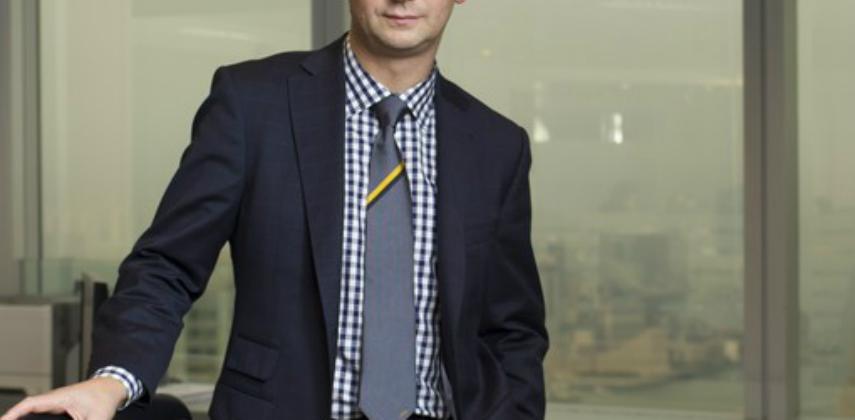Following a short-lived stint as a professional footballer in the UK that was brought to an end by an injury, Marc Burrage shifted his focus to the automotive sector, where he spent nine years in sales and marketing. But like so many in his current line of work, a job search landed him a role at a recruitment firm. Since then, the British executive has enjoyed a string of successes in the industry, culminating in his new role as regional director for Hays Hong Kong.
What challenges did you encounter in shifting from the automotive to the recruitment sector?
When making the transition, I noticed a lot of commonalities between the industries, but also some distinct differences.
The main commonality is that sales is sales, marketing is marketing. But in one space you have a product and the other, a service – and that takes some thinking through.
The service we offer in recruitment is to provide the best possible outcome for client and candidate. So we have two stakeholders. The challenging part about that is that both of these stakeholders can change their mind. If you’re selling a product, it won’t change its mind after you’ve shipped it. This tends to make recruitment a far more complex interaction.
What’s your approach to management?
I’m a big believer in leadership as distinct from management. When I was based in New Zealand, I sat on the board of trustees for the Leadership Institute of New Zealand, so it’s something I’m actually very passionate about.
What I’m looking to build here, as in any organisation I’m leading, is what I call a “leader-ful” organisation. By that I mean everyone in the organisation feels that they have responsibility and a right to lead, regardless of their role or their title.
I’m looking to create an organisation that isn’t bound by job-title or hierarchy, but rather by a collection of valuable individuals. Everybody has a unique contribution to make. They’re all valued.
Ultimately, of course, there will be times where I need to make decisions, and they may be difficult decisions.
What I commit to the business and the way I like to operate is with as much transparency as possible at all times.
People don’t want to have a perfect leader. They want an authentic leader, a leader they can trust.
How will you change the way Hays does its business here?
When I look at our business, what I notice is that we really have an opportunity to experience the “good to great” journey. We’re already up there as one of the market leaders. My goal is to make sure that we’re recognised as the undisputed number one.
That’s really about figuring out how to supercharge what we’ve already got. It’s about having a very clear, forward-thinking strategy. The first step to that is deciding what are we not going to do.
Once we’ve decided what we’re not going to do, we can really focus on being excellent at the things we do choose to do.
As with most businesses that went through the 2007 downturn, there was a pre-GFC [global financial crisis] strategy and a post-GFC strategy. What I want is a strategy with a risk profile that allows us to work in whatever economy we’re in.
So we need to strengthen our core business and then look carefully at avenues for diversification. In doing so, we need to avoid taking on too many projects, because that will result in goal diffusion. But I absolutely see some key opportunities for us to explore different sectors and develop new product lines. I’m also looking to add significant headcount to give us the capacity to deliver in those spaces.
What new sectors and product lines you’re considering exactly?
So far, we’ve predominantly focused on permanent private-sector recruitment, but I see opportunities for us to look more broadly at other sectors.
Like many of our competitors, we were very heavily involved with investment banking. Everybody chases that rainbow when it’s there, but ultimately it’s a case of too many eggs in too few baskets. Post-GFC, we’ve seen everybody rush to everything but investment banking. The key, however, is to have the right spread.
One area that hasn’t really been explored much is the public sector. We know there’s significant investment going into infrastructure projects so there may be some opportunities that flow out of that.
From a product perspective, we’re looking at the temporary and contracting staff market. We’ve heard a lot about the reticence – culturally – about temporary and contracting roles as opposed to permanent roles. But that’s starting to change. There’s an increasing appetite and acceptance among both employees and employers.
How will you address the ongoing uncertainty in the job market?
My approach to uncertainty is to gather information – not sit on the fence – and make a decision.
When faced with adversity, managers should strive to make informed decisions as quickly as they can. If they’re required to drive change, they should do so as fast as possible, but at a rate the organisation can handle. Of the decisions you make, you may get about 70 per cent right. You fix the remaining 30 per cent and move on. We need to make decisions. There’s nothing worse, in my mind, than indecision. Life’s about choices, you have to make them as you go.
I’ve worked with complexity and ambiguity. For an enterprise-wide perspective, the key thing is a sustainable risk profile.


